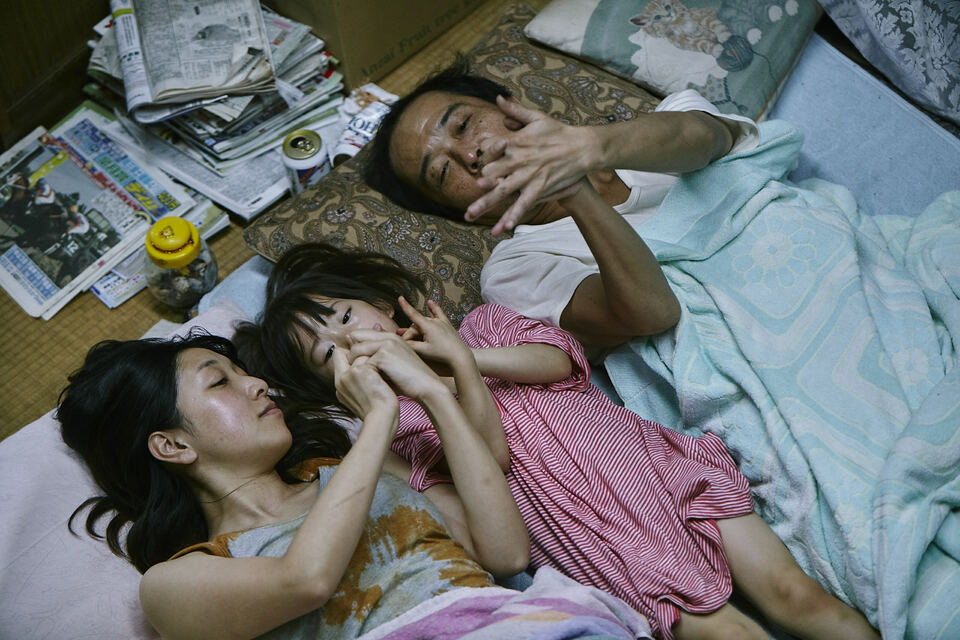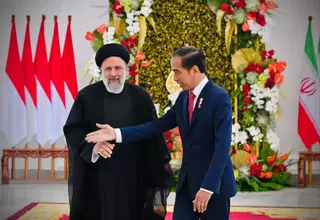'Shoplifters': Not Poverty Porn

Jakarta. The full list of nominations for the Academy Awards will be revealed on Jan. 7, but the shortlists for several nominations are already known to the public, including for the Best Foreign Language Film.
One of the most hyped films in that category is "Shoplifters" by the Japanese "master of humanism," Hirokazu Kore-eda.
Indonesian audiences were lucky enough to catch the movie during Pekan Sinema Jepang (Japanese Cinema Festival) in early December. Screenings were packed to full house and tickets for an extra show on Dec. 16 were sold out within hours.
Kore-eda's latest masterpiece has also been nominated for a Golden Globe, having already won Best FIlm at the Asia Pacific Screen Awards and bagged the Palme d’Or at Cannes Film Festival.
They are well-deserved recognitions for this mini masterpiece. Please note that Shoplifters is definitely not your typical sob story about innocent families trapped in dire poverty (hello "Keluarga Cemara").
The first half of the movie is at times melodramatic, but never sappy, as it paints you a neo-social-realist picture of a poor family in Tokyo that lives in a tiny, traditional Japanese home surrounded by skyscrapers.
The members of the family are stuck with dead-end jobs and methodically shoplift to make ends meet.
The first scene of the film takes place in a supermarket where father Osamu Shibata (Lily Franky) and son Shota Shibata (Kairi Jo) – or at least they appear to be father and son, more on this later – shoplift some groceries.
On the way home, they discover little girl Yuri (Miyu Sasaki), playing outside on the balcony of an empty flat. It is the middle of winter in Tokyo, so Osamu and Shota decided to take Yuri home, effectively kidnapping her.
The family plans to return Yuri once her parents come back, but upon seeing marks of physical abuse on her arms, they decide to keep her.
Kore-eda is totally in his elements here, teasing out natural performances from his frequent collaborators Lily Franky and Kirin Kiki, portraying poverty not as an end in itself but also as a way to present a critique of a capitalistic modern Japan and creating complex characters whose lack of black-and-white morality forces us to investigate our sympathy for them.
Shoplifters is not a feel-good story that argues being in a loving but poor family is better than being in a loveless one.
The closest it comes to melodrama is by having the characters question if it would be better to be able to choose the family you like instead of being born into one you can't escape.
Shoplifters is not a Japanese version of "Keluarga Cemara." Poverty is not here to teach you moral lessons, it is here to be dissected and analyzed as a sociologist or a political scientist would have it.
There are twists at the end of this sad tale that bring the main characters down from whatever moral high horse we the audience may have envisioned for them, and which make them even more interesting and multidimensional.
Family is Kore-eda's forte, and here, like in his other works, the fragile relationship between the family members is put under the microscope. There is always something that they do that makes us scream, "But that's not very family-like!"
Kore-eda's earlier "Our Little Sister" (2015), for example, tells the story of three sisters (and a half-sister) making peace with their father’s multiple marriages.
The eldest daughter, Sachi Kouda (Haruka Ayase), at first appears to be a role model for her younger sisters, but when it is revealed she is also in love with a married man, the fractiousness of our own assumptions of family values is exposed.
Children becoming victims of the adults' bad choices is a familiar trope in Kore-eda works, including in "Nobody Knows" (2004) and "After the Storm" (2016).
One of the most haunting lines in Shoplifters is spoken by the mother, Nobuyo (a superb Sakura Ando): [Does] giving birth automatically makes you a mother?" – her cryptic answer when she is questioned why she "kidnapped" Yuri.
Slowly we realize that each family member might not be who we think they are at first. Is Hatsue the grandmother and matriarch actually related to the rest of the family? Why does the dad, Osamu, keep insisting that Shota calls him "Dad", isn't he one already? How come older sister Aki has a sunny disposition unlike the rest of the family? Is she even related to Shota?
At the end of the movie we find that one of the characters' motivations to stick together in the tiny house is for, yes, you guessed it, money.
But should this revelation make us less sympathetic to the characters' plight? Should it make their suffering less true?
Shoplifters ends with Kore-eda's piercing accusation that the world is broken and that the family unit, even the one you choose, can not protect you from it.
By the time we get to a touching montage at the end of the film, as a lonely Yuri looks out of a crack on her balcony fence and Shota looks back plaintively at Osamu from inside a moving bus, we may very well come to the conclusion that the children's deeply flawed, ragtag family could be the best they can ever get.
Shoplifters may confuse with its smorgasbord of moral dilemmas, which may pull us back and forth from sympathy to revulsion in an instant. But Kore-eda is not a cynical puppet master (though you can definitely enjoy seeing him deliver plot payoffs at the right time almost every time), everything he does is suffused with compassion for humanity and the family.
The director's anger at a broken world sneaks up on you and will make you reach for your tissues not just once, but Shoplifters is no poverty porn. In fact, it's a film that tells you to stop crying (eventually) and start contemplating the meaning of family instead.
Tags: Keywords:POPULAR READS
Apple Wants to Increase Investments in Vietnam
Vietnam has become more important to Apple as the company seeks to diversify its supply chains away from China.China’s Top Diplomat Wang Yi to Visit Indonesia for Cooperation Talks
Chinese top diplomat Wang Yi will chair a policy coordination meeting aimed at strengthening Indonesia-China cooperation.President Jokowi Urges Global Restraint as Tensions Rise in the Middle East
President Joko "Jokowi" Widodo emphasized the importance of diplomatic efforts to prevent the escalation of conflict in the Middle EastKPK Identifies Sidoarjo Regent as Suspect in Corruption Probe
KPK has identified Ahmad Muhdlor Ali as a suspect in a corruption case involving the Sidoarjo Regional Tax Service AgencyEconomic Concerns Overshadow Security Worries for Indonesians in Iran
Indonesian citizens currently in Iran are more concerned about rising inflation than the security situation in the country.Popular Tag
Most Popular






















